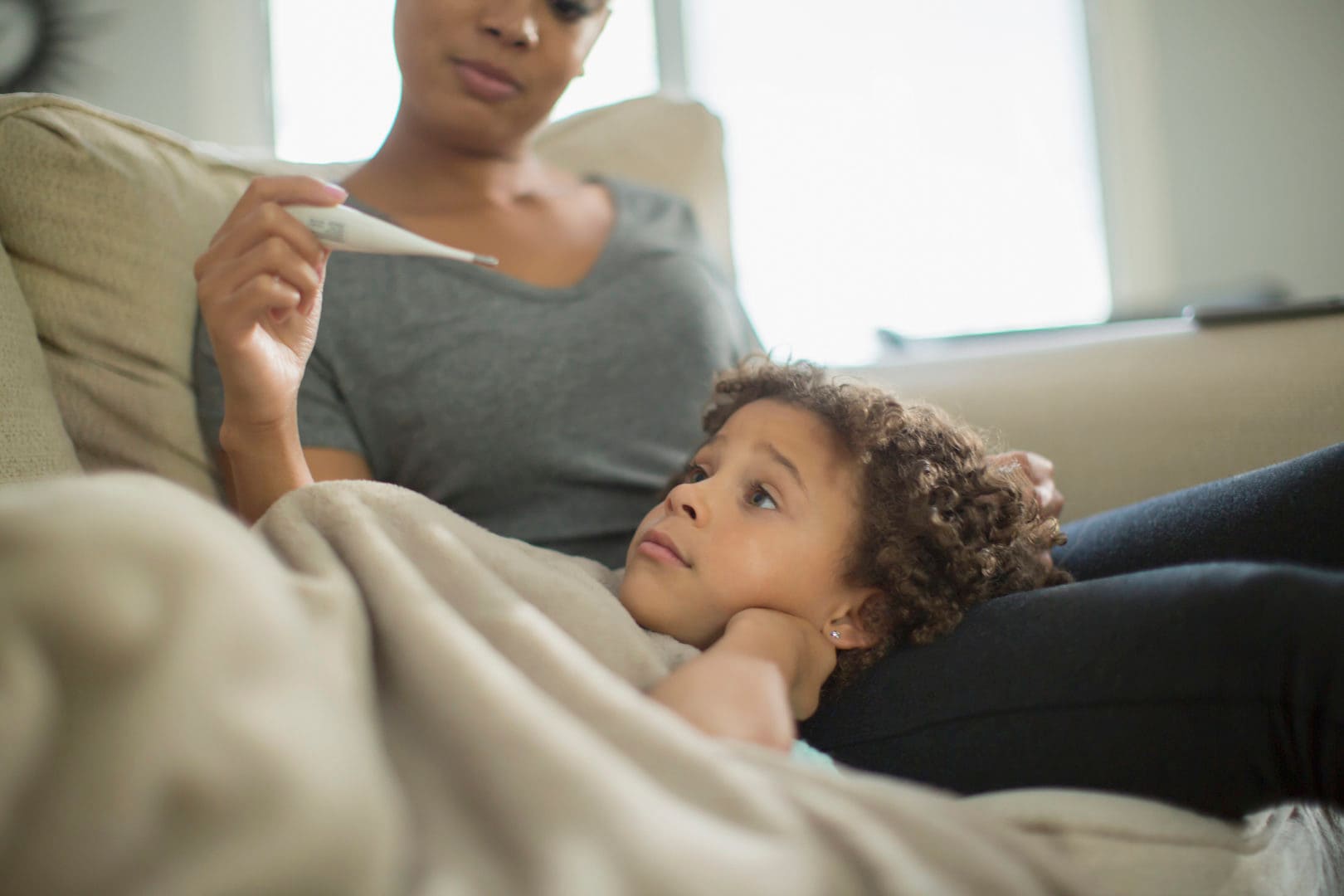
Your child's daycare sick policy exists for a reason. Read on to see why daycares have sick policies and learn what yours is.
Nicole Fabian-Weber Updated on: January 22, 2024
One of the many benefits of daycare is that working parents needn’t ever worry about their child care abruptly being cancelled. Unlike babysitters and nannies, who (understandably) get sick or have unforeseen circumstances crop up, daycare is consistently reliable — except when your child is the one coming down with something.
Almost every daycare center has a policy about keeping kids home when they’re sick, and while it can be inconvenient for parents who are left scrambling to rearrange their entire day, such policies are important for overall health and safety. “Ideally, parents should send their children to daycares with thoughtful policies around illness,” says Dr. Larry Kociolek , pediatric infectious diseases specialist at Lurie Children’s Hospital of Chicago. “The policies should be comprehensive and consistent with national and local public health guidance in order to mitigate the risk of illness.”
“Ideally, parents should send their children to daycares with thoughtful policies around illness.”
—Dr. Larry Kociolek, pediatric infectious diseases specialist
Wondering about your child’s daycare sick policy? Here’s what the experts want you to know.
Daycare sick policies, also known as exclusion for illness policies, exist for a reason. In addition to children needing rest (and snuggles) when they’re under the weather, without a daycare sick policy, the potential for virus and disease spread is high. (And that’s saying a lot since, on average, kids who attend daycare during their first year get 8-12 more colds than kids who are at home without exposure to siblings.) Put simpler: Your child’s daycare sick policy is in place to protect the health and well being of everyone — teachers and students — who attends, as well as the community at large.
“Health and safety should be taken very seriously at child care centers,” says Sarah Redgrave, vice president of center operations at KinderCare Education . Redgrave notes that KinderCare has “ always had an exclusion for illness policy,” but the policy evolves with local health department guidelines.
Something else to keep in mind: Illness doesn’t always strike at night or first thing in the morning, so it’s possible your child may need to leave their daycare in the middle of the day. “We’ve always had a policy of notifying families if their child has a fever while in our care,” Redgrave says. “We ask that a family member pick up the child as soon as possible and recommend that the family seek medical care for their child.”
Just as the Centers for Disease Control (CDC) doesn’t regulate vaccine requirements for schools and child care centers (though they recommend them), daycare health policies are state, not federally, regulated, so rules widely vary. (To put things in perspective: Only seven states in the U.S. require kids to get immunized for the flu in order to attend daycare.)
In Texas , for instance, state mandate requires licensed daycare centers not to admit a child if they exhibit a number of symptoms, including:
In New Jersey , the daycare sick policy mandate includes the above in addition to the following:
It’s also worth noting that, in order to be a licensed daycare facility by the state, a child care center has to adhere to policies on “immunizations, handwashing, diapering and other methods to stop the spread of disease,” according to ChildCare.gov . You can also find out your state’s specific daycare health requirements in the National Database of Child Care Licensing Regulations .
When looking for a child care center, one of the first things you should find out about is the daycare sick policy , as it will help keep your family and community safe. Again, these rules vary by state, but generally daycare centers want children to be symptom-free of the following for 24 hours:
Additionally, the American Academy of Pediatrics (AAP) recommends keeping kids out of daycare when they have any of the following specific diagnoses:
“If a daycare center or provider doesn’t have a clear exclusion policy, or if the director is not able to explain what the policy is, that should give parents pause,” Redgrave says. “The caregiver should be able to explain exactly what they do to keep children safe and healthy.”
“If a daycare center or provider doesn’t have a clear exclusion policy, or if the director is not able to explain what the policy is, that should give parents pause .”
—Sarah Redgrave, vice president of center operations, KinderCare Education
She adds that centers should be upfront about any health issues that would require a child to stay home, as “there shouldn’t be any surprises when it comes to the steps a caregiver is taking to keep everyone healthy.”
No parent wants to get a phone call from their child’s daycare when they’re at work, asking them to pick their little one up. But again, in order to be a state licensed child care center, having an exclusion policy is a requirement since it helps keep the community safe.
If you feel that your child’s daycare sick policy is inconveniencing your family, consider shopping around for an alternative, such as in-home child care (which doesn’t necessarily need to be licensed) or a babysitter or nanny.
“During my son’s first year of daycare, he was constantly sick with a cold or cough,” says mom of three Jaclyn Santos of Hazlet, New Jersey. “Every week it was something and we kept having to keep him home. Eventually, we decided to alter our work schedules and hire a nanny. It was more costly, but we don’t have jobs where we can work from home, so it was worth it to not have to keep missing work.”
Having to miss work because your child can’t attend daycare due to minor symptoms can be inconvenient, but overall, it’s for the best — and it shows that their daycare center has your family’s best interest at heart.
Says Redgrave: “[Exclusion policies] can be difficult for families, especially if parents are unable to work from home, but we encourage families to keep kids home if they feel unwell or display any [illness] symptoms, as it’s the best way to prevent the spread of illness.”

At what age can a child babysit a sibling? All the details, according to experts

Why setting house rules for kids is crucial — and how to ensure they stick

Is white noise safe for babies? Here’s what experts say

How to help tweens or teens navigate toxic friendships

30 fun ‘would you rather’ questions for kids

The back-to-school mental load is no joke: How to manage the uniquely stressful season
Like what you're reading?
Join Care for FREE
The email address you entered is already registered. Would you like to log in?
Join Care for FREE
Create a free account to access our nation wide network of background checked caregivers.
By clicking "Join now," you agree to our Terms of Use and Privacy Policy.
Welcome to Care!
You're on your way to finding someone your family will love.
Start now Continue reading article
Care.com does not employ any caregiver and is not responsible for the conduct of any user of our site. All information in member profiles, job posts, applications, and messages is created by users of our site and not generated or verified by Care.com. You need to do your own diligence to ensure the job or caregiver you choose is appropriate for your needs and complies with applicable laws.
Care.com® HomePay℠ is a service provided by Breedlove and Associates, LLC, a Care.com company.
Care.com is a registered service mark of Care.com, Inc. ©2007-2024 Care.com, Inc. All rights reserved.